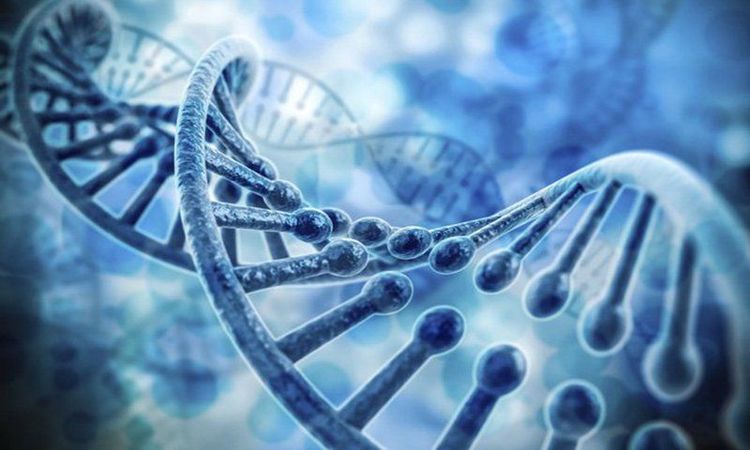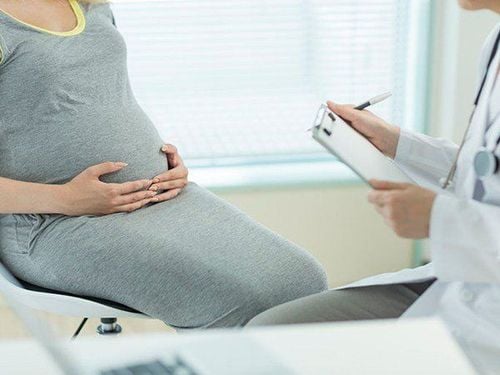This is an automatically translated article.
Thyroid disorders can cause significant fertility problems for women and testing for thyroid disease should be considered for women with fertility problems and repeated early miscarriages . So women taking hyperthyroidism pills can get pregnant?
1. Thyroid hormone and related problems during pregnancy
A new study shows that high levels of thyroid hormone can be directly toxic to the developing fetus. The miscarriage rate increases three to four times in mothers with excess thyroid hormone, says Dr. Samuel Refetoff, of the department of genetics and molecular medicine at the University of Chicago. During the first few weeks, the developing fetus is completely dependent on the mother's supply of thyroid hormone. Without enough hormones, the fetus will have impaired intellectual development and even death. However, excess hormone is also harmful and can be worse than too little.
2. Hereditary syndromes related to thyroid hormone and pregnancy
In a study that focused on a family of Portuguese descent with an inherited thyroid hormone-related syndrome, people with this mutation produced more thyroid hormone than usual. However, an excess is normal for them, so they don't suffer from the increased metabolism, heart rate, and other problems normally caused by excess hormones.
For women who inherit this genetic mutation, pregnancy can be problematic, and if the child does not inherit the mutation, the mother's excess thyroid hormone will also become excessive for the fetus. The team analyzed the medical records of 167 family members, including 36 couples, and compared the pregnancies of affected mothers or affected fathers with those without the mutation. and reviewed miscarriage rates, birth weight, and neonatal thyroid hormone levels. The results showed that the miscarriage rate of couples whose mother was affected by the number of miscarriages was 23% higher. 2% for pregnancies with affected fathers and 4% for pregnancies with unaffected mothers.
Children without thyroid hormone resistance born to affected mothers (those with high thyroid hormone levels) weigh significantly less than babies born to mothers without affected. Due to the mother's high thyroid hormone levels, infants with a normal thyroid system respond by not making their own thyroid hormone. Within a few weeks of birth, they begin to make their own thyroid hormone. High levels of this hormone can cause direct toxic effects on fetal development. It is important to realize that over-substitution appears to be detrimental.

Hội chứng di truyền được chứng minh có liên quan đến hormone tuyến giáp và việc mang thai
3. See your doctor when you have a thyroid problem
Dr. Ellen Seely, director of the clinic for pregnancy-related endocrine disorders at Brigham-Women's Hospital in Boston. In the US, the overall miscarriage rate is as high as 23%. Thyroid problems are important but manageable. Therefore, women who have thyroid problems and are planning a pregnancy should discuss changes in their thyroid hormone dosage with their doctor.
If you find out you are pregnant, get a blood test immediately. This test is called a thyroid-stimulating hormone (TSH) test. Ashi Daftary, a professor of maternal and fetal medicine at the University of Pittsburgh School of Medicine, most miscarriages are caused by chromosomal defects that are not caused by factors like hormone levels. Most women taking hyperthyroid drugs will not require changes during pregnancy. Instead of adjusting the dose by 30%, the doctor should closely monitor it very early so that appropriate adjustments can be made. A large number of women taking thyroid medication will not need any increase in dosage.
4. Take More Thyroid Hormone If Pregnant
As soon as they find out they are pregnant, women taking thyroid hormone should increase their dosage. A woman's need for thyroid hormone increases during the first weeks of pregnancy. During these weeks, the developing fetus is completely dependent on the mother's supply of thyroid hormone. Erik K. Alexander, a doctor at Brigham and Women's Hospital in Boston, and colleagues note that a deficiency in this hormone puts the fetus at risk of impaired mental development and even death. Alexander's team found that most women need extra thyroid hormone starting about eight weeks into their pregnancy. Women of childbearing age should be screened for thyroid deficiency.
Thyroid problems often cause fertility problems in women including overactive and underactive thyroid. Treating even minor illnesses can improve your chances of getting pregnant, possibly reducing your risk of miscarriage, and improving your baby's health.

Phụ nữ dùng hormone tuyến giáp nên tăng liều lượng khi biết mình mang thai
5. Thyroid problems can harm women's fertility
Research published in the journal Obstetrics & Gynecology found that 2.3% of women with fertility problems have an overactive thyroid (hyperthyroidism), compared with 1.5% in the general population . This condition is also associated with menstrual irregularities. Abnormalities in thyroid function can adversely affect reproductive health and lead to reduced conception rates, increased risk of miscarriage, and adverse pregnancy and newborn outcomes.
Researchers have also found a strong association between hypothyroidism, hyperthyroidism, and infertility, as well as adverse pregnancy and neonatal outcomes. Therefore, periodic screening for thyroid dysfunction at the beginning of pregnancy and especially when seeking fertility treatment or coping with a miscarriage is essential. The thyroid gland produces hormones that play an important role in growth and development. Changes in thyroid function can greatly affect reproductive function before, during, and after conception.
Hypothyroidism (underactive thyroid) affects about 0.5% of women of reproductive age. According to the researchers, in children and adolescents this condition is associated with delays in sexual maturation. In adult women, hypothyroidism is linked to menstrual problems and lack of ovulation in some cases, new research shows. The researchers also note that thyroid disease is associated with an increased risk of problems during pregnancy, including miscarriage, pre-eclampsia, poor fetal growth, preterm birth, and stillbirth. . However, with proper screening and prompt management these risks can be significantly reduced. Overactive and underactive thyroid conditions are very common in healthy young women and the current recommendation from the American College of Obstetricians and Gynecologists is to begin screening at age 35. It can prevent you from ovulating and is one of the leading causes of irregular menstrual problems.
Currently, Vinmec International General Hospital deploys a package maternity service to help screen for thyroid disease and monitor treatment if problems are detected. Doctors will have a treatment plan to keep the thyroid hormone levels in balance and stabilize the health of both mother and baby during pregnancy.
It is very good to diagnose and screen for thyroid disease in pregnant women at the earliest during pregnancy and should be done. Ideally, before planning a pregnancy, women need to have a screening test for thyroid disease to make sure it is in normal condition to ensure the best health for both mother and fetus. The examination at the hospital is always performed by a team of qualified doctors with modern equipment and facilities, helping to diagnose and treat the best results.
Please dial HOTLINE for more information or register for an appointment HERE. Download MyVinmec app to make appointments faster and to manage your bookings easily.
Reference source: webmd.com












